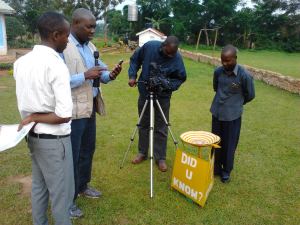UGANDA’S ANGELS INITIATIVES SPURS GROWTH FOR INNOVATIVE BUSINESS START -UPS

By Paul Ndiho
Angels Initiatives Launchpad is a business hub in Uganda where business ideas from young rising entrepreneurs are nurtured. Students are mentored and taught leadership and management skills by professionals from the corporate world.
The Angels Initiatives office in Uganda is a highly creative space where young entrepreneurs meet and share and development ideas. The hub is a business incubator and support center that provides innovators with the infrastructure for business growth, and where budding entrepreneurs can see their concepts take off. 
Entrepreneurs receive lessons from professionals in the corporate world and have face-to-face sessions with the members. George William Bakka is the C.E.O. Angels Initiatives.
“At angles initiatives basically our work is about supporting emerging entrepreneurs and what we do is to provide capital, business advisory services and office work space services.”
Angels Launchpad runs several initiatives including, angels hub, which is the business development center for early start ups, and the Africa youth investment fund, a cloud investment platform that bridges the financing part for emerging businesses – by linking entrepreneurs to potential investors.
Burgeoning entrepreneurs do not pay back the cash, but the fund shares all profits and losses for a set period of time. Backer says that over the last a few years, his Launchpad has helped several small businesses grow into larger businesses.
“Currently we have about twenty seven operating from this space. We offer them a space where the start a business, work from, lower their cost and give them visibility. But this year we are also going out further to see what more can we now do to actually help them build structures in terms of operations, financials and even help them to see if they can scale up.
Angels initiatives provide professional and affordable office space within a strategic location in Kampala’s city center. This gives potential clients easy access to the country’s business hub. The company currently houses more 27 start-ups. Kanyisigye Amon, is the owner of Neblink an investment company taking advantage of the angels facilities.
“It’s an investment company that is relatively seemlier to angels. We give people an opportunity to invest. We deal with majorly online investments and technology.”
Mabonga Simon peter, is the sales and marketing director, Africa youth investment fund
“We allow people to invest with us and at the end of the day they get returns. We are regulated by capital markets authority, a regulating body which allows us to collect money from individuals, put it in some other investment and give returns to them. We give loans to people, we finance business and at the end of the day they bring returns, we finance farmers, we give funds to entrepreneurs boast up their business and they pay back with an interest.”
Joshua Opio, director white flacon, launched his computer and event management business here more than two years ago.
“First of all, i get to enjoy confortability by customers, when they come in, because i sale lap tops, they will look at it as a professional thing because of the environment, the ambiance is really okay and when i seat here i get to meet my clients from the board room they feel comfortable buying something from me.”
Steven kaganda runs an agricultural management business, and says he could not have found a better office space to interact with his clients.
What we are doing basically is designing of farm sustainable structures under which we have greenhouse systems; we do the structural frame work designs and the irrigation systems. Then we also construct bio gas plants – for renewable energy systems that are used by domestic farmers. We also do supply of irrigation supply equipment, large machinery and structuring out the layout of best irrigation designs that our farmers may require at any one time.
Other start-ups taking advantage of the office space include Florence Tama’s maid and cleaning services. She says she’s able to meet high-end clients because of this location.
“We provide people services. We connect maids, nannies to stable clients. We want to make a difference.”
George William Bakka says helping emerging entrepreneurs is something he does because of his primary belief that helping young entrepreneurs will spur development.
“I believe to the core of my spirit that entrepreneurship is the solution to all problems in the world and I also believe that development in Africa can only come out if can support the entrepreneurial class to create jobs to produce products and services.”
Angels initiatives has graduated 127 entrepreneurs from Uganda.



